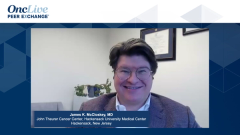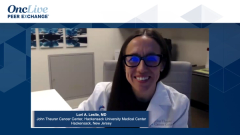
Subcutaneous Mosunetuzumab in Follicular Lymphoma
A hematologist-oncologist discusses a recent abstract looking at subcutaneous mosunetuzumab in the first line for patients with follicular lymphoma.
Episodes in this series

This is a synopsis of a Peer Exchange series featuring James K. McCloskey, MD, and Lori A. Leslie, MD, of John Theurer Cancer Center, Hackensack University Medical Center.
Dr. Lori Leslie, Associate Professor of Medicine and Director of Indolent Lymphoma and CLL Research Programs at the John Theurer Cancer Center, highlights exciting data presented at the 2022 ASH Annual Meeting evaluating subcutaneous administration of the CD20/CD3 bispecific antibody mosunetuzumab as frontline treatment for follicular lymphoma. Mosunetuzumab is currently FDA-approved for relapsed/refractory follicular lymphoma after ≥2 prior lines. However, frontline chemoimmunotherapy remains standard of care for most follicular lymphoma patients requiring treatment.
This phase 1b study administered 8-17 cycles of subcutaneous mosunetuzumab using a step-up dosing approach in the first cycle followed by once every 3 weeks maintenance. Notably, no inpatient admission was required. The primary endpoint of best overall response rate was 96% by independent review, with 81% complete response rate. All 22 complete responses occurred after the first response assessment around 3 months. However, the median follow-up was short at 6 months, necessitating further evaluation of durability.
Overall, mosunetuzumab demonstrated excellent tolerability and predictable, manageable cytokine release syndrome that was generally mild and occurred during the first cycle. Two progressive disease events occurred, including one CD20-negative transformation and one potential misdiagnosed transformation that was actually diffuse large B-cell lymphoma present at baseline.
In summary, this study indicates promising activity of convenient subcutaneous mosunetuzumab for frontline follicular lymphoma patients requiring treatment. Larger studies with longer follow-up are needed to confirm safety and durable efficacy. But given the high response rates, manageable toxicity, and oral administration, Dr. Leslie suggests this chemo-free approach could transform the follicular lymphoma treatment paradigm.
*Video synopsis is AI-generated and reviewed by OncLive editorial staff.






































